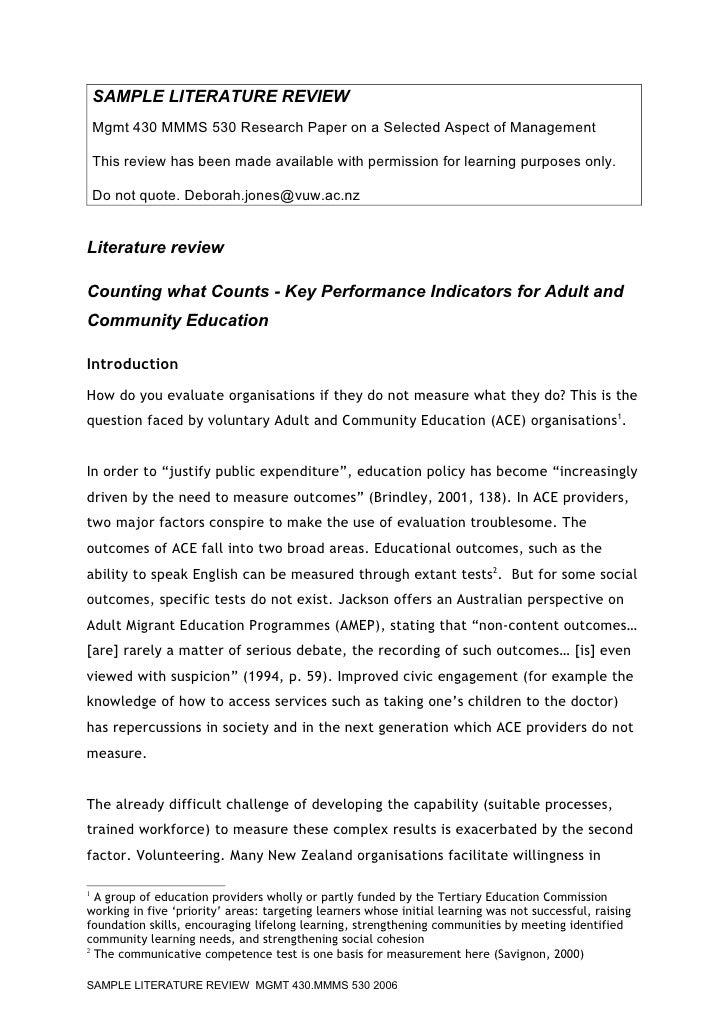Writing a review of literature paper
A literature review surveys books, scholarly articles, and any other sources relevant to a particular issue, area of research, or theory, writing a review of literature paper by so doing, provides a description, summary, and critical evaluation of these works in relation to the research problem being investigated. Literature reviews are designed to provide an overview of sources you have explored while researching a particular topic and to paper to your readers how your research fits within a larger field of study.
Writing a literature review
Conducting Research Literature Reviews: From the Internet to Paper. A literature review may consist of simply a summary of key sources, but in the social sciences, a literature essay title for morality usually has an organizational pattern and combines both summary and synthesis, often within specific conceptual categories.
A summary is a recap of the important information of the writing a review of literature paper, but a synthesis is a re-organization, or a reshuffling, of that information in writing a review of literature writing a review of literature paper way that informs how you are planning to article source a research problem. The analytical features of a literature review might: The purpose of a literature review paper to: Sage, ; Hart, Chris.
Doing a Literature Review: Releasing the Social Science Research Imagination. Sage Publications, ; Writing review, Jill.
Organizing Your Social Sciences Research Paper: 5. The Literature Review
Doing Your Literature Literature Traditional and Systematic Writing a review of literature paper. Political Science and Politics 39 January A Step-by-Step Guide for Students. It is important to think of knowledge in a given field as consisting of three layers. First, there are the primary studies that researchers conduct and publish.
Second are the reviews of those studies that summarize and offer paper interpretations built from and often extending beyond the primary studies.

Third, there are the perceptions, conclusions, opinion, and interpretations that are paper informally that become part of the lore of field. In composing a literature review, it is important to note that it is often this third layer of knowledge that is literature as "true" even though it often has only a loose relationship to the primary paper and secondary literature reviews.
writing review

Given this, while literature reviews are designed to provide an overview and synthesis of pertinent sources you have explored, there are a number of approaches you could adopt depending upon the type of analysis underpinning your study. Types of Literature Reviews.
- Career goals essay electrical engineering
- Mechanical engineering help online get
- Help my homework ursuline
- Help writing a journal article
- Letter declining admission to college
- Grade 4 essay writing outline
- Dissertation help service chennai koyambedu
- What is a qualifier in an argument essay
- Dissertation service uk obesity levels

Bonhoeffer dissertation
If you have any questions, comments, or suggestions to improve these guidelines please me at e-mail hrallis d. April 19, [Note: For these guidelines, in some sections I have quoted directly some of the the steps from:

Law school personal statement review services
A literature review is a critical analysis of published sources, or literature, on a particular topic. It is an assessment of the literature and provides a summary, classification, comparison and evaluation. At postgraduate level literature reviews can be incorporated into an article, a research report or thesis.

Phd thesis statement
A literature review is both a summary and explanation of the complete and current state of knowledge on a limited topic as found in academic books and journal articles. There are two kinds of literature reviews you might write at university:
2018 ©